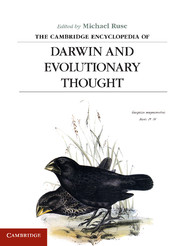Book contents
- Frontmatter
- Contents
- Contributors
- Preface
- Acknowledgments
- Introduction
- 1 Origins and the Greeks
- 2 Evolution before Darwin
- 3 Charles Darwin’s Geology
- 4 Looking Back with “Great Satisfaction” on Charles Darwin’s Vertebrate Paleontology
- 5 The Origins of the Origin
- 6 Darwin and Taxonomy
- 7 Darwin and the Barnacles
- 8 The Analogy between Artificial and Natural Selection
- 9 The Origin of Species
- 10 Sexual Selection
- 11 Darwin and Species
- 12 Darwin and Heredity
- 13 Darwin and Time
- 14 Darwin’s Evolutionary Botany
- 15 Mimicry and Camouflage
- 16 Chance and Design
- 17 Darwin and Teleology
- 18 The Evolution of the Origin (1859–1872)
- 19 Alfred Russel Wallace
- 20 Darwin and Humans
- 21 Darwin and Language
- 22 Darwin and Ethics
- 23 Social Darwinism
- 24 Darwin and the Levels of Selection
- 25 Darwin and Religion
- 26 Darwinism in Britain
- 27 Darwinism in the United States, 1859–1930
- 28 The German Reception of Darwin’s Theory, 1860–1945
- 29 Darwin and Darwinism in France before 1900
- 30 Encountering Darwin and Creating Darwinism in China
- 31 Darwinism in Latin America
- 32 Botany
- 33 Population Genetics
- 34 Synthesis Period in Evolutionary Studies
- 35 Ecological Genetics
- 36 Darwin and Darwinism in France after 1900
- 37 Botany and the Evolutionary Synthesis, 1920–1950
- 38 The Emergence of Life on Earth and the Darwinian Revolution
- 39 The Evolution of the Testing of Evolution
- 40 Mimicry and Camouflage
- 41 The Tree of Life
- 42 Sociobiology
- 43 Evolutionary Paleontology
- 44 Darwin and Geography
- 45 Darwin and the Finches
- 46 Developmental Evolution
- 47 Darwin’s Evolutionary Ecology
- 48 Darwin and the Environment
- 49 Molecular Biology
- 50 Challenging Darwinism
- 51 Human Evolution after Darwin
- 52 Language Evolution since Darwin
- 53 Cultural Evolution
- 54 Literature
- 55 Darwin and Gender
- 56 Evolutionary Epistemology
- 57 Ethics after Darwin
- 58 Darwin and Protestantism
- 59 Creationism
- 60 Darwin and Catholicism
- 61 Judaism, Jews, and Evolution
- 62 Religion
- 63 From Evolution and Medicine to Evolutionary Medicine
- Bibliography
- Index
53 - Cultural Evolution
Published online by Cambridge University Press: 05 May 2013
- Frontmatter
- Contents
- Contributors
- Preface
- Acknowledgments
- Introduction
- 1 Origins and the Greeks
- 2 Evolution before Darwin
- 3 Charles Darwin’s Geology
- 4 Looking Back with “Great Satisfaction” on Charles Darwin’s Vertebrate Paleontology
- 5 The Origins of the Origin
- 6 Darwin and Taxonomy
- 7 Darwin and the Barnacles
- 8 The Analogy between Artificial and Natural Selection
- 9 The Origin of Species
- 10 Sexual Selection
- 11 Darwin and Species
- 12 Darwin and Heredity
- 13 Darwin and Time
- 14 Darwin’s Evolutionary Botany
- 15 Mimicry and Camouflage
- 16 Chance and Design
- 17 Darwin and Teleology
- 18 The Evolution of the Origin (1859–1872)
- 19 Alfred Russel Wallace
- 20 Darwin and Humans
- 21 Darwin and Language
- 22 Darwin and Ethics
- 23 Social Darwinism
- 24 Darwin and the Levels of Selection
- 25 Darwin and Religion
- 26 Darwinism in Britain
- 27 Darwinism in the United States, 1859–1930
- 28 The German Reception of Darwin’s Theory, 1860–1945
- 29 Darwin and Darwinism in France before 1900
- 30 Encountering Darwin and Creating Darwinism in China
- 31 Darwinism in Latin America
- 32 Botany
- 33 Population Genetics
- 34 Synthesis Period in Evolutionary Studies
- 35 Ecological Genetics
- 36 Darwin and Darwinism in France after 1900
- 37 Botany and the Evolutionary Synthesis, 1920–1950
- 38 The Emergence of Life on Earth and the Darwinian Revolution
- 39 The Evolution of the Testing of Evolution
- 40 Mimicry and Camouflage
- 41 The Tree of Life
- 42 Sociobiology
- 43 Evolutionary Paleontology
- 44 Darwin and Geography
- 45 Darwin and the Finches
- 46 Developmental Evolution
- 47 Darwin’s Evolutionary Ecology
- 48 Darwin and the Environment
- 49 Molecular Biology
- 50 Challenging Darwinism
- 51 Human Evolution after Darwin
- 52 Language Evolution since Darwin
- 53 Cultural Evolution
- 54 Literature
- 55 Darwin and Gender
- 56 Evolutionary Epistemology
- 57 Ethics after Darwin
- 58 Darwin and Protestantism
- 59 Creationism
- 60 Darwin and Catholicism
- 61 Judaism, Jews, and Evolution
- 62 Religion
- 63 From Evolution and Medicine to Evolutionary Medicine
- Bibliography
- Index
Summary
What kinds of things fall within the scope of evolutionary theory? One view holds that evolutionary theory concerns how populations of biological entities (such as genes, organisms, and species) change over successive generations. Another view maintains that evolutionary theory deals with how populations of any kind change over successive generations. This latter view is implicit in the vast literature on cultural evolution, a literature that addresses the evolution of such diverse things as religious beliefs, scientific theories, social norms, vocabulary, technologies, agricultural techniques, and corporate practices. Most generally, “cultural evolution” refers to the various ways that an evolutionary perspective may be applied to the study of culture and society.
As the term “evolution” has acquired various meanings, the term “cultural evolution” is also employed in several ways. For nineteenth-century thinkers such as Herbert Spencer and Lewis Henry Morgan (Fig. 53.1), “evolution” was synonymous with “progress” or “development.” These thinkers posited natural laws of cultural evolution whereby human societies all pass through the same sequence of developmental stages, from primitive to civilized. Their theories of cultural evolution bear little connection to evolution as Darwin understood it, and they have long been discredited.
- Type
- Chapter
- Information
- The Cambridge Encyclopedia of Darwin and Evolutionary Thought , pp. 428 - 435Publisher: Cambridge University PressPrint publication year: 2013
- 2
- Cited by



